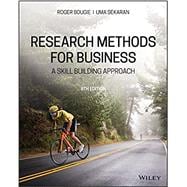Research Methods For Business, 8th Edition explains the principles and practices of using a systematic, organized method for solving problematic issues in business organizations. Designed to help students view research from the perspective of management, this popular textbook guides students through the entire business research process. Organized into six main themes—Introduction, Defining the Management and the Research Problem, Theory, Collecting Information, Drawing Conclusions, and Writing and Presenting the Research Report—the text enables students to develop the skills and knowledge required to successfully create, conduct, and analyze a research project.
Now in its eighth edition, this popular textbook has been thoroughly updated to incorporate substantial new and expanded content, and reflect current research methods and practices. The text uses a unique blended learning approach, allowing instructors the flexibility to custom-tailor their courses to fit their specific needs. This innovative approach combines the face-to-face classroom methods of the instructor with internet-based activities that enable students to study what they want, when they want, at their own pace.








